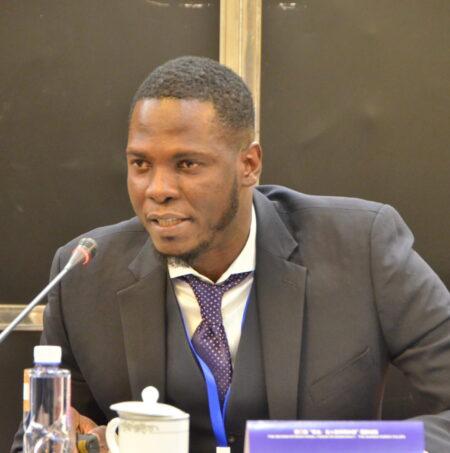Dr. Ibrahima Niang
University affiliation: University Cheikh Anta Diop of Dakar, Senegal
Fellowship period: September to October 2023
The Digital Silk Roads in Africa

Project Description
It is rare, even impossible, to find an African country absent from the digital Silk Roads. The Chinese digital or technological footprint is present in all the states of the African continent. Examples include: internet and government intranet projects, the installation of vast fiber optic networks, submarine cables, construction of data centers, supply of terminals, creation of the smart initiative cities and safe cities. Chinese companies are leading the way in the technological field in Africa, supplanting larger American and European manufacturers.
However, it should be noted that the breakthrough by the Chinese Huawei Group in Africa preceded the New Silk Roads initiative. It was initiated with the implementation of the Going Out or Going Global policy of Chinese leaders like Jiang Zemin and Hu Jintao. It was designed to deal with the overproduction of Chinese companies, their need for new outlets, and the surplus of foreign currencies in the Chinese banking system. In Senegal, Huawei won the first major project funded by China since the establishment of diplomatic relations between Beijing and Dakar in October 2005. The aim of this program was to participate in the modernization of public administration in Senegal; the establishment of a broadband network using new technologies and for making the extension of the administrative government intranet management of all services to reach all parts of the country.
At the heart of these digital Silk Roads – which draw much sympathy and criticism – the Huawei Group is rewriting the future of technology in Africa. Although the US has been warning countries across the world that technology developed by Chinese firms like Huawei and ZTE could present a security risk, African countries have by and large ignored such calls.
It is important to draw a provisional assessment of the “win-win” partnership touted by China to see if it has benefited partner countries. Were the digital Silks Roads a debt trap? Are they a threat to African digital sovereignty? Could African countries say no to China when it brings them technology? Has the Western reluctance to support the information and communication technology (ICT) sector left an open window for China?
Silk Road Talk: The Digital Silk Roads in Africa: How the Chinese Huawei Group is Rewriting the Future of Technologies in Senegal
Research Interests
- Decolonial studies
- African sociology
- Economic sociology / international relations
- Africa-China and Turkey relations
Vita
Ibrahima Niang holds a PhD in Sociology from the University Cheikh Anta Diop of Dakar, Senegal. He is an assistant lecturer at the Department of Sociology and his teaching focuses on economic sociology, African sociology and anthropology, international relations, and China’s geopolitics in Africa. He has stayed extensively in China and was engaged in research at the CODESRIA (Council for the Development of Social Science Research in Africa) programme (Africa-China) and the School of Agriculture and Rural Development of the People’s University of China. He holds a Certificate in Economic Development from the Chinese Academy of Social Sciences. Ibrahima Niang is the author and co-author of numerous scientific articles and reports on development issues and foresight, academic freedom, migration, conflicts, research governance and epistemology, and social movements. He was a Fellow at the Edinburgh African Studies Center, UK, and holds an individual research fellowship at the Africa Peacebuilding Network (APN) of the Social Sciences Research Council (SSRC). He was Post-Doctoral Research Fellow at the University of Cape Town, Institute of Humanities (Knowledge activism – strengthening African publishing and dissemination – Open Society Foundations). He speaks his native language Wolof, French, English, Mandarin and German. He is a member of the committee organising an Africa-Asia festival in Dakar in 2025.
Selected Publications
- Niang I., 2023. Twyford Ceramics: Chinese Capitalism Enterprises in Senegal. In: Shaping the future of Africa-China engagement, CORA report 2023
- Niang I., 2020. Chinese enterprises in Senegal, 01 / 2020 Rosa Luxembourg Stiftung Research Papers on Social Justice in West and Central Africa
- Niang I., 2016. “Does Africa Have Technical Specifications for Dealing with Emerging Powers?", in Reconnexion de l’Afrique à l’économie mondiale. Défis de la mondialisation, under the director of Abdelali Naciri Bensaghir, Codesria, Dakar, ISBN : 978-2-86978-638-7, 2016, pp. 197-215.
- Niang I., 2016. "The African Policy of China Between Optimism and Mistrust, Building the African Agenda? in La présence chinoise en Afrique, Olivier Mbabia & François Wassouni, directors, no.1, Paris, Monde Global Editions Nouvelles. ISBN: 979 10 90 854 215, Nouvelles, Collection Essais/Sociologie, pp.270-291
- PhD thesis: The Relationships Between China and Senegal: Context, Issues and Prospects, Cheikh Anta Diop University of Dakar, Faculty of Arts and Humanities, Ethos, 2016.
- Niang I et al., 2015. Research on the Relationship Between National Security and Rural Governance in China, 1994-2016 China Academic Journal Electronic Publishing House, Beijing, China, pp 79-84. DOI:10.14063/j.cnki.1008-9314.2015.02.037
